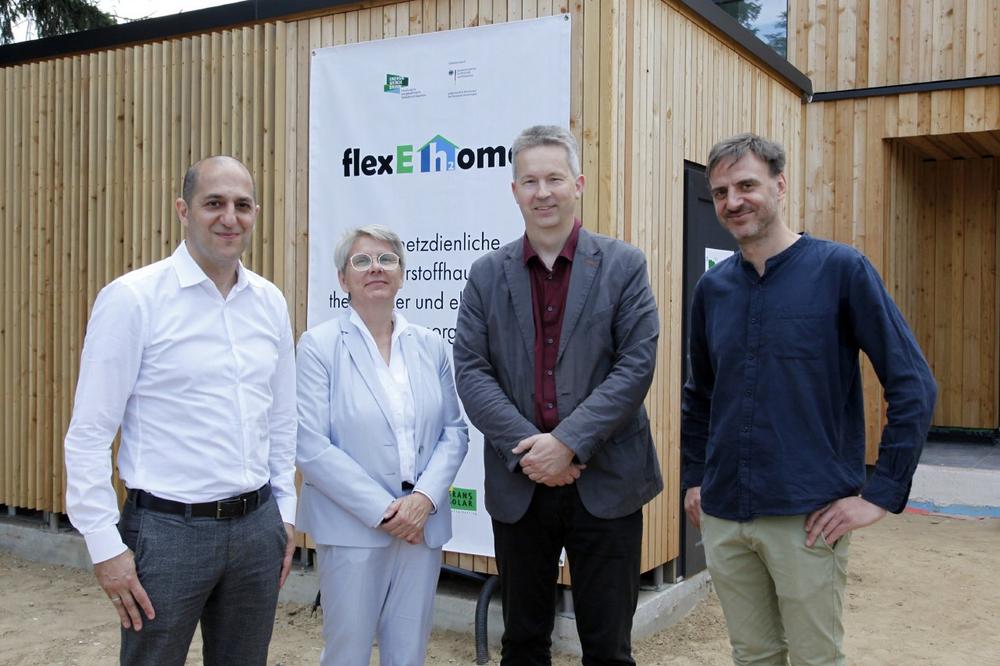- First grid-serving hydrogen home with year-round electricity and heat self-sufficiency
- Grid-serving as a key factor of the energy transition
- „FlexEhome“ research project, funded by the Federal Ministry for Economic Affairs and Climate Action
HPS Home Power Solutions AG yesterday inaugurated the world’s first grid-serving solar-hydrogen home with year-round electricity and heat self-sufficiency in Schöneiche bei Berlin. Dr Claudia Herok, Head of the Department for Energy and Raw Materials at the Brandenburg Ministry for Energy, ceremoniously commisioned the plant. The house was built as part of the "FlexEhome" research project, which is funded by the Federal Ministry for Economic Affairs and Climate Action. In addition to HPS, the heat pump manufacturer Vaillant, the house manufacturer Albert Haus and the Technical University of Berlin are also involved.
Special about the "FlexEhome" project is that it tests grid-serving capacities. At present, most buildings with photovoltaic systems and batteries produce too much electricity for their own demand in the summer and too little in the winter. This places an increasing burden on the distribution grids, which require fossil fueled reserve power plants. In the "FlexEhome" project, electricity is only fed into the grid or withdrawn from it when it serves the grid. This is only achievable due to a significantly larger storage capacity compared to batteries and a lossless energy storage over longer periods of time. Thanks to this flexibility, grid stability is improved and the need for expansion of the decentralised distribution grids is minimised.
“This means that we, already today, can offer the future technical standard of house manufacturing. The owners of such a building contribute substantially to grid stability and supply security. Going forward, these decentralised flexibilities are indispensable considering our aspirations of a successful energy transition”, Zeyad Abul-Ella, CEO and founder of HPS, states.
A key component of the project is the long-term electricity storage system picea, which stores the surplus electricity from the photovoltaic system in the form of hydrogen via electrolysis in the summer and makes it available again as electricity and heat in the winter using a fuel cell. Already having been sold more than 500 times, picea, in this case in combination with a heat pump, ensures the year-round supply of the house with the self-generated solar power.
Dr. Claudia Herok, Head of the Department for Energy and Raw Materials within the Brandenburg Ministry for Economic Affairs, Labour and Energy, emphacised during the ceremony: “Already since the turn of the millenium Brandenburg has become a leading region for the expansion of renewables and for designing the new world of energy. So I am very happy about the fact, that with “FlexEhome” the world’s first grid-serving solar-hydrogen home has been built in Brandenburg.”
Dominik Rothweiler from Vaillant Germany, who integrated the heat pump into the house concept, adds: “The fact that we are able to participate in this unique and innovative project and make a significant contribution to its success with our heat pump fills us with great pride. Now it’s time to fine-tune the power-controlled regulation of our heat pump in interaction with picea during operation and draw further conclusions.” The Technical University of Berlin will monitor all energy flows in the house for two years to document full supply and grid efficiency. During this time, a family of four will rent the “FlexEhome”.
Regarding the background of the “FlexEhome”
Many buildings with photovoltaic systems feed more electricity into the grid over the course of a year than is needed for their own electricity and/or heat supply. However, particularly photovoltaic systems without seasonal storage feed electricity into the grid when there is already an excess of renewable energy, leading to negative prices in the electricity market and, potentially, grid congestion. In such cases, the CO2 reduction achieved through this feed-in is minimal since the electricity cannot be utilized. On the other hand, buildings with photovoltaic systems but without seasonal energy storage have a significant electricity demand during periods of under-supply of renewable energy in the grid, which often occurs during the winter months. During this time, the electricity supplied by the grid is carbon-intensive. In winter 2020, the share of fossil fuels in the electricity mix was more than 60 percent.
You can find additional information on the project website: https://www.flexehome.de.
HPS is the world leader in the development and production of integrated energy storage systems based on green hydrogen for homes, multi-family houses and commercial properties. HPS addresses important areas of the energy transition with its innovative picea year-round electricity storage system. The surplus energy generated by a photovoltaic system on sunny days is stored as green hydrogen and used in the dark season to supply electricity and heat. Thus, buildings can be provided with solar energy from their own roofs all year round. The Berlin-based company was founded in 2014 by Zeyad Abul-Ella and Dr. Henrik Colell. HPS has won several prestigious awards with picea, most recently the Handelsblatt Energy Award, the Berlin-Brandenburg Innovation Award and the Sustainability Challenge of the German Sustainable Building Council (DGNB).
For more information, visit: www.homepowersolutions.de.
HPS Home Power Solutions AG
Carl-Scheele-Str. 16
12489 Berlin
Telefon: +49 (30) 235914-600
http://www.homepowersolutions.de
PR-Manager
Telefon: +49 (30) 235914-612
E-Mail: reiner.schwebke@homepowersolutions.de
![]()
